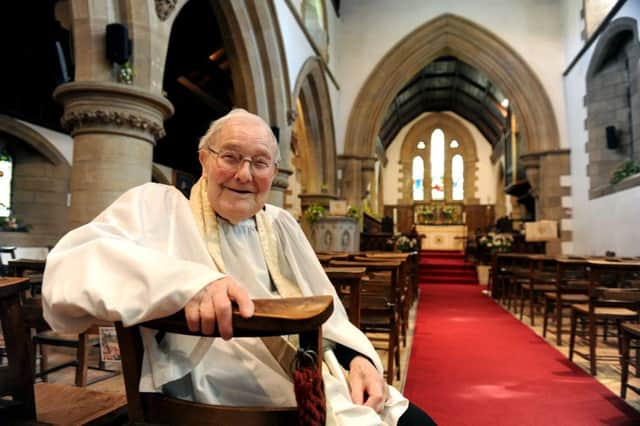Canon John Clayton


Born in Leeds in 1911, he studied at Leeds University and Wells Theological College, and was ordained as a priest at Wakefield Cathedral in 1936. He was posted to parishes across Yorkshire and had a spell as Canon of Bradford Cathedral and another working as a chaplain in Wakefield Prison. Born in Leeds in 1911, he studied at Leeds University and Wells Theological College, and was ordained as a priest at Wakefield Cathedral in 1936. He was posted to parishes across Yorkshire and had a spell as Canon of Bradford Cathedral and another working as a chaplain in Wakefield Prison. But in the mid-1960s he landed in Otley, and it was there, he said that some of his happiest memories were made.
At the top of that list, he said, was his involvement in the installation of the first Easter cross on the Chevin.
Advertisement
Hide AdAdvertisement
Hide AdIt had been in 1968 that a group of churches in the Otley area got together with the aim of raising awareness of the Easter message. The result was the 32ft high cross, which for the last half century has been erected at the start of Lent, standing high above the town as a symbol of hope.
“I was one of a dozen or so people who helped get the project off the ground and I was privileged to preach the sermon on that first Easter Sunday,” he recalled, looking back on his first 100 years.
“When it was in the planning stages there were some people who didn’t think it would work, but more than 200 turned up the first time we hauled it into position and they’re still going today.
“It shows that sometimes if you take a bit of a risk it pays off.”
Advertisement
Hide AdAdvertisement
Hide AdAfter 82 years as a priest, retirement was a concept to which he paid only lip service.
“I say I retired, but I never really did,” he said. “When I came to Bramhope, I started helping out at the church during the holiday season and just found that I kept on going.”
People, he said, were “very interesting, occasionally a little naughty and more often than not very lovable”.
Having lived through two world wars and seen more than two dozen prime ministers go through the revolving door of 10 Downing Street, he had a unique perspective on the world.
Advertisement
Hide AdAdvertisement
Hide Ad“It seems to me that for all the lives that have been lost and for all the conflicts that have been fought we haven’t learned many lessons,” he said. “We seem to go down the same old paths and then seem surprised by the outcome.”
He carried a reminder of the cost of war, in the form of his stole, which had been given him by the widow of Rev David Railton, an army chaplain in the First World War whose idea it had been that there should be a tomb for the Unknown Warrior. King George V took up the suggestion and arranged for the memorial that rests to this day in Westminster Abbey.
In 1997, Canon Clayton was one of the recipients of that year’s Royal Maundy Money. The awards are presented by the Queen in recognition of those who devote their time and energy to the Church.
“It was a very proud moment,” he recalled. “I used to be quite fiery in my youth. When I was first ordained I never needed a microphone, but none of my congregation ever fell asleep. I’m much more mellow these days and understanding. I think you can always look back and wonder whether you should have done things differently, but I don’t have any regrets.”
His wife, Louie, died in 1986 and he is survived by their daughter, Stella, a grandson and great grandson.